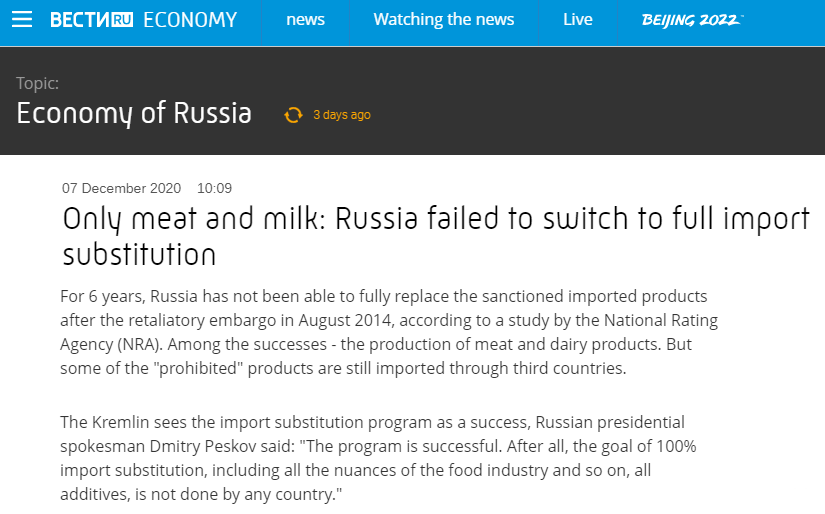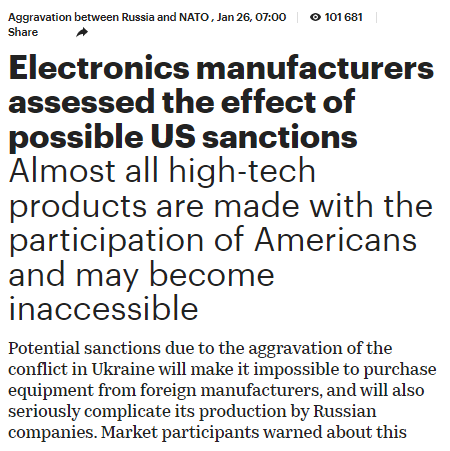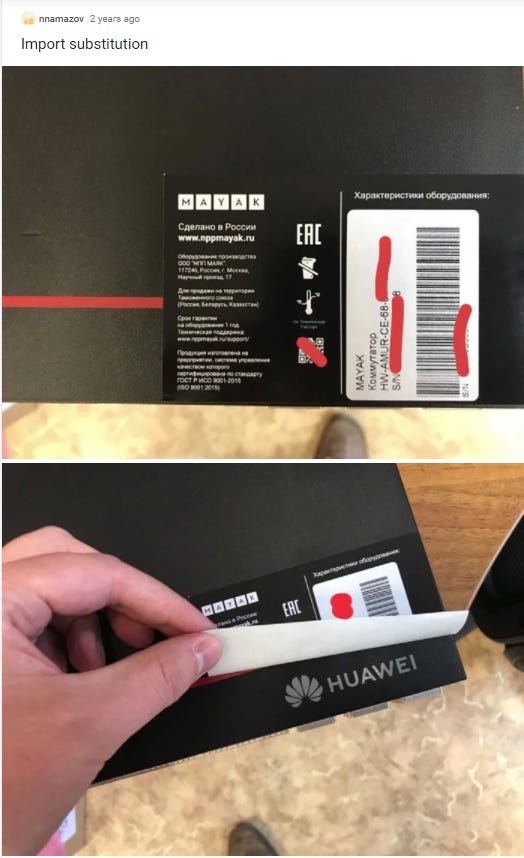Is Russia self-sufficient?
Washington threatens sanctions, again, for the 10,000th time. Does Moscow care?
Washington’s favorite hobby is drone-bombing faraway lands for no reason whatsoever; its second-favorite activity is sanctioning Russia. Also for no reason at all.
So it’s not exactly surprising that the United States is threatening Moscow with new economic restrictions, allegedly to dissuade the Russians from any monkey business in Ukraine. Okay, whatever.
Regardless of what happens or doesn’t happen in Ukraine, Washington will inevitably find other excuses to slap Moscow with fresh sanctions. (“Nancy Pelosi is dissatisfied with the results of her weekly face-lift and now demands a blood sacrifice,” etc. etc.)
So the thing is… Does Moscow even care?
Russia’s ambassador to Sweden, Viktor Tatarintsev, recently commented on this important question.
“Excuse my language, but we don’t give a shit about all their sanctions,” Tatarintsev told Swedish media on Saturday, adding that Russia is now more “self-sufficient” thanks to Washington’s seemingly endless economic warfare.
Accurate? Yes, but also no.
Mixed results from import substitution
Import substitution—a top priority for the Kremlin following Washington’s Crimea-related sanctions and Moscow’s counter-sanctions on EU food imports—has super-charged Russian agriculture. For example, in 2018 Russia became the world’s top wheat exporter. Meat and dairy production has also greatly benefited from the food embargo; 2021 saw a record fruit harvest.
These are certainly praiseworthy achievements. But—there’s always a but—if the objective of import substitution was to make Russia less reliant on Washington and its vassals, there’s still a lot of work to be done. Mostly because Russia is still importing produce from the European Union that is simply rerouted through a third country. Cheaters!
As Vesti reported at the end of 2020, banned European stuff still finds its way to Russia via “re-export” trickery:
The supply of “forbidden” Norwegian fish to Chile has tripled, which is then transported to the Russian Federation. Ecuador supplies 22% of fruits to Russia and has replaced the European Union in this market. But in addition to its own products, Ecuador also supplies “forbidden” products—Ecuador has increased its purchases of these products in Europe by 7 times, which is much higher than the domestic consumption of Ecuadorians.
Supplies of vegetables from Europe to the Russian Federation were partially replaced by China. The share of Chinese vegetables in imports rose to 21% from 8% in 2013. But at the same time, China has tripled its purchases of vegetables in the European Union.
This highlights a larger issue: limiting trade with the EU doesn’t mean Russia has become more self-sufficient; it just means it’s importing less from Europe. To a large extent, import substitution has really been more about finding new trade partners who aren’t beholden (as much) to Washington. This transition has not been without its drawbacks, however: the quality of some products has suffered, while prices have increased as a result of a less competitive market.
Over six years, the share of foreign goods in Russian stores has decreased by 3 percent—from 42 to 39 percent. This is not exactly a radical change.
But in terms of ramping up food production—definitely “key” if you want to be self-sufficient—import substitution has been successful.
In other sectors Russia is highly vulnerable.
Electronics: Russia’s Achilles’ heel?
Washington’s latest economic threats against Moscow reportedly include restricting access to chips (the non-potato type) and electronics. This is a problem.
Russia’s domestic tech industry is not doing so great. It’s not entirely Moscow’s fault, either: in 2016, Russia’s tech sector was hit by US sanctions limiting the import of dual-use technologies.
The good news is that Russia’s defense industry does not mess around with imported electronics; the bad news is the rest of Russia is heavily reliant on chips and other tech designed in the US or manufactured using American equipment.
According to a report from 2018, 93 percent of chips imported to Russia can be traced back to the United States. Even though less than 1% of these products come directly from the United States, the Treasury Department could impose a blanket ban on all US-linked tech imports.
This is nothing to sneeze at. As Izvestia reported on February 1, “In the current situation, import substitution in the event that Russian companies are disconnected from foreign software and electronics is impossible without a catastrophic loss of competitiveness of services provided by Russian companies.”
In terms of software and IT, import substitution has been a major flop. Even state-owned companies have struggled (one might say “failed”) to replace foreign-made software with domestic analogues. In December, it was determined that Russian-made processors were unsuitable for large companies hoping to switch to domestic servers.
The perpetual party-poopers at Nakanune.ru have two recent and very provocative articles about the troubles facing Russia’s domestic tech industry.
Here’s an excerpt from an interview with economist and ex-deputy chairman of the Accounts Chamber [it’s a finance-related committee—Edward] Yuri Boldyrev:
“All the talk about import substitution, adopted for strategic industries, has remained just talk… In the field of electronics, we are not only lagging behind, but we continue to pursue a policy of thoughtless, irresponsible and frivolous borrowing of key units and devices from the United States, moreover, from what the United States specifically supplies for so-called third countries.”
In a separate interview, ex-senator of the Federation Council Anton Belyakov argued Russia’s high-tech sector was in deep, deep doo-doo.
You don’t need to be 100% self-sufficient, probably
Of course, Russia doesn’t need to be completely self-sufficient. That’s not even the goal, really. Moscow’s aim is to shield itself from economic shenanigans. Progress has been made. But there are still serious issues that need to be addressed. The sooner the better.
Long-term, it’s unlikely US sanctions will remain effective or even relevant. So that’s another option: just do nothing and wait for the United States to completely implode.
Who knows what will happen? Maybe Jan Hammer knows. Nah.
If you enjoy Edward Slavsquat consider upgrading to a paid subscription! Your generous financial support will allow us to expand our reporting from the outskirts of Moscow; donors receive access to our top secret and very famous Telegram channel! Very cool.








Everyone always complains about Russian domestic cheese (for good reason). My local farmer's market dairy family took a course in cheese making and now for several years has made homemade cheese (from their own amazing organic milk) that is as good or better than what I've had in the US or Europe. I don't even miss the Finnish imported cheese any more...
Excellent analysis of the sanctions issue, goes deeper than the "omg, we're about to be 100% self sufficient, make deals in yuan and US dollar gonna crash tomorroz LOLz".
Could be a 5D chess move: Putin provokes the West, knowing they can only do sanctions, no more US chips with surveillance technologies, then Russia stops being developed technologically, and eventually a nationwide QR code scanning system can't be implemented anymore! But the Soviet era nukes still work because they're made with analog technologies like attaching copper wire to a tin can and guiding it with a flashlight all the way to Washington. Then it's check mate!